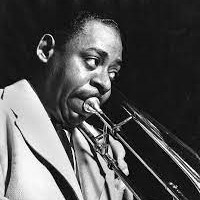Home » Jazz Musicians » Tricky Sam Nanton
Tricky Sam Nanton
A native of the West Indies, Nanton joined the Ellington orchestra in 1926, as a trombonist. He was a key player in the development of the bands overall sound and also remembered for his use of the plunger mute. Joe Nanton, was born, in 1904. His professional career as a trombonist began in Washington with pianist Cliff Jackson. From 1923 to 1924 he worked with Frazier's Harmony Five. A year later he performed with banjoist Elmer Snowden. At age 22 Joe Nanton found his niche in Duke Ellington's Orchestra when he reluctantly took the place of his friend Charlie Irvis. He remained a member of the orchestra until his early death in 1946. Many people asked Nanton how he acquired and formulated his style. In 1921, he heard Johnny Dunn playing the trumpet with a plunger, and thought the plunger would also sound good when used with the trombone. When Joe Nanton joined the Ellington band he was anxious and ready to play a solo. He had been playing with the band for several weeks before Duke Ellington let him take a solo. Luckily, alto saxophonist Toby Hardwick convinced Ellington to let him play. According to Barney Bigard, "...he [Joe Nanton] grabbed his plunger. He could use that thing, too. It talked to you. I was sitting there, looking up at him, and every timed he'd say 'wa-wa,' I was saying 'wa-wa' with my mouth, following him all the way through." Because of his ability, Nanton earned the nickname "Tricky Sam". Toby Hardwick named him "Tricky Sam" because what someone else could do with two hands, "Tricky Sam" could do with one. "Anything to save himself trouble- he was tricky that way." Tricky Sam soon teamed up with Bubber Miley and was soloing on a regular basis. They worked together, playing in harmony and "playing off each other" "Playing off each other" refers to taking the musical idea of the preceding soloist and developing it until it becomes one's own new musical idea. Tricky Sam and Bubber Miley were the first musicians to get wide recognition for their unique plunger sounds and style. There playing almost always represented a mood, person, or picture. Together, they set the characteristic tone and expressiveness of the other brass soloists in the band. Nanton and Miley developed the band's famous "jungle" effects through their use of the growl and plunger. The growl effect is best described by Duke Ellington's son, Mercer Ellington.
Read more













